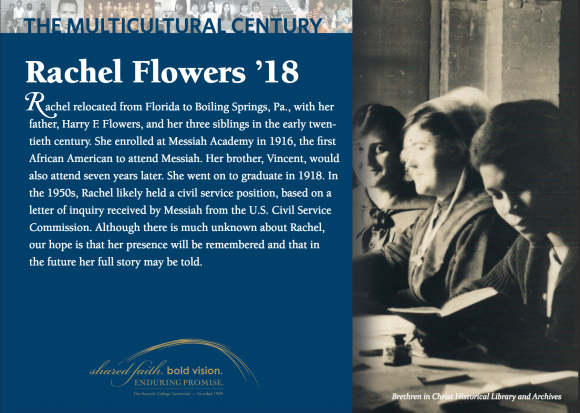Maddie Conley
Online Editor
It is no secret that Messiah College is predominately white. Though our posters, pamphlets and website may show a relatively balanced ratio, walking around campus you see the real picture. As unbalanced as it may seem now, there was a time when Messiah had only white students. But with Messiah’s nondiscriminatory policies, the school was open to the world, and the world eventually came.
Rachel Flowers became the first black student to attend Messiah College in 1916. She studied at Messiah for two years before going home to work as a housekeeper and school teacher while hosting local black leaders in her home. In 1930, Flowers and her siblings moved to Philadelphia. This is when Flowers began to publically speak out against the segregation she was experiencing. The Philadelphia Tribune published her article “What Have you to Say?: A System that Breeds Prejudice.” After this, Flowers went on to join many organizations such as the John Brown Memorial Association, the North Philadelphia Voters League and the Philadelphia Branch of the Negro History Association to fight the injustice facing the black community. Eventually, Flowers’ name faded away, unseen in newspapers, and tucked away deep in the Messiah archives.
Down in these same archives is where we meet Christina.
In 2012 Christina Thomas, ‘14, a student at the time, was the research assistant to Bernardo Michael, Professor of History, working with diversity affairs. She was encouraged to pursue not only the research projects she was given by Michael but her own projects as well.
Three years prior, Hierald Osorto, ‘06, had conducted a short research project which looked into the multicultural history of Messiah College. “I think it is important to honor firsts, particularly at colleges that are predominately white,” Osorto said.

Osoto’s preliminary work was made into posters to celebrate Messiah’s multicultural roots at the centennial in 2009.
As part of the college’s centennial celebration in 2009, Osorto created posters including short write-ups for the first multicultural students to attend Messiah. In addition to a short paragraph outlining Flowers’ history was the hopeful sentence, “Although there is much unknown about Rachel, our hope is that her presence will be remembered and that in the future her full story may be told.”
That sparked Thomas’s interest. “Being an African American student at Messiah and knowing my experience there, the good and bad, I wanted to know what her experience was like,” Thomas said.
But uncovering Flowers’ experience proved more challenging than anticipated. Whether Flowers never wrote on her time at Messiah or documents were not saved, the archives lacked information on her time at Messiah. Besides some scattered writings from her life after Messiah, Flowers’ college experience remained a mystery.
Nonetheless, Thomas studied the Flowers family long past graduating from Messiah, but into her graduate and doctoral work. She began a blog entitled Diary of a Historian to document the story she was uncovering.
As Michael reflected on Osorto and Thomas’s research experience, he recognized a beautifully woven story including not only Flowers but the students that were looking for her.
“The pursuit of Rachel and those involved in that journey is equally important,” said Michael. “these students [Osorto and Thomas] gave up a lot to do this research…that to me, even though Rachel remains silent, is very exciting and encouraging.”
Michael expressed his hope in the younger generation to begin looking into the past they may not know much about. “It is Important to recognize this history so that it doesn’t become lost,” Thomas said. “How are we ever going to change anything unless we go back and revisit history,” Michael said.
Osorto expressed a similar sentiment when he said, “The way you look at your past is the way you look at the future you want to build.”
Now, 100 years since her graduation from Messiah, The Office of Diversity Affairs is hosting a celebration of Flowers’ life and legacy. Events will extend from Septemeber 13-15, including a lecture from Thomas, an exhibition at Murray Library and a jazz performance.

